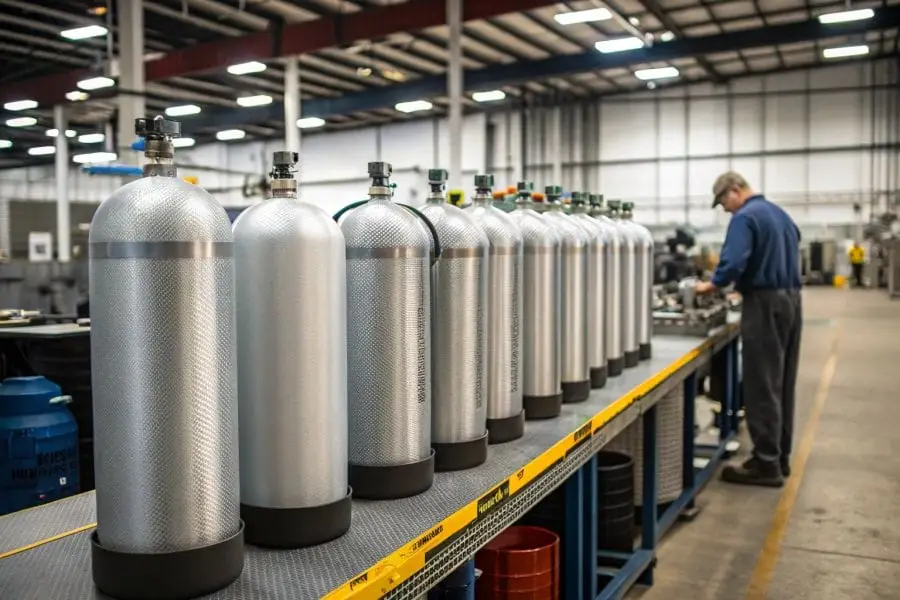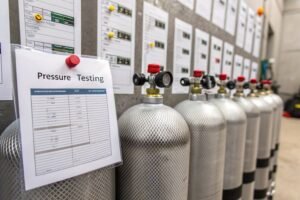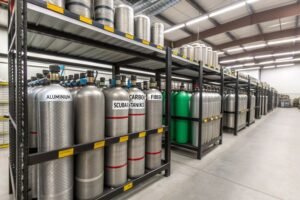Are you struggling to find reliable, affordable scuba tanks for the growing beginner market? You feel stuck between cheap tanks that hurt your reputation and expensive ones that shrink your margins. This guide will help you find that perfect balance.
Sourcing the best beginner scuba tanks means focusing on certified safety, manageable weight, and proven durability at a fair price. A wholesaler's success depends on partnering with a manufacturer who guarantees quality, communicates clearly, and delivers on time.
I have spent my entire career in the gas cylinder business. I have talked to hundreds of wholesalers, distributors, and shop owners just like you. The challenge is always the same. You need to find a product that your customers will trust, and you need a supplier that you can trust. It is a simple goal, but it is not always easy to achieve. I wrote this guide to share what I have learned. I want to help you navigate the process, ask the right questions, and build a stronger business. Let's walk through it together.
Why should your business focus on the beginner diver market in 2025?
Are you wondering where your next wave of customers will come from? If you ignore the beginner market, you miss out on the single biggest group of buyers in the industry. Focusing on beginners is the smartest way to build a stable, long-term business.
You should focus on the beginner diver market because it is the largest and most consistent segment of the industry. By providing excellent entry-level gear, you earn a customer's trust and loyalty from the very beginning of their diving journey, securing future sales.
The Foundation of Your Customer Base
The beginner market is the lifeblood of the entire dive industry. I have watched the market trends for years, and one thing is constant: new people are always discovering the magic of the underwater world. After recent global events, even more people are looking for unique outdoor experiences. This is a huge opportunity for your business. When you cater to a beginner, you are not just making one sale. You are starting a relationship.
Think about it. Beginners need everything. They need a mask, fins, a regulator, and of course, a tank. Their first purchase is often a complete package. This means a higher value for that first sale. More importantly, they are looking for a guide. They do not know the difference between brands yet. They rely completely on your expert advice. If you sell them a high-quality, reliable first scuba tank, your store becomes their store. They will come back to you for air fills, for their advanced courses, and for their equipment upgrades down the line. I have personally seen my wholesale partners in Southeast Asia double their business by creating smart, high-quality "beginner kits." The demand is real, and it is waiting for you.
What do new divers truly value in their first scuba tank?
Do you find yourself guessing what a beginner wants in a scuba tank? Stocking the wrong products leads to inventory that does not move and sales you never make. The key is to understand what they really need: safety, comfort, and simplicity.
New divers value safety above all else. They want a tank that feels secure, is not overly heavy, and is easy to handle. Durability and a fair price are also critical factors that build their confidence in both the equipment and in your business.
Looking Through the Eyes of a New Diver
Let's put ourselves in a beginner's fins. Diving is exciting, but it is also intimidating. They are learning to breathe underwater. The scuba tank is their lifeline. Their feelings about that tank will shape their entire experience. So, what are they thinking about?
- "Is this safe?" This is the number one question. They are not experts. They cannot tell good quality from bad just by looking. They need to trust you, and they need to trust the equipment. The tank must feel solid and well-made. Any sign of poor quality will create doubt.
- "Can I even carry this thing?" Weight and balance are huge factors. A tank that is too heavy or awkward makes the whole process feel like a chore. A comfortable, manageable tank lets them focus on learning and enjoying the dive.
- "Will it last?" Beginners are on a budget. They are making a big investment in a new hobby. They need to know their gear will last more than one season. They will inevitably bump and scrape their tank. It needs to be tough enough to handle it. A durable tank is a good value.
They are not looking for fancy features. They are looking for confidence. When you stock a tank that is safe, comfortable, and durable, you give them that confidence.
Aluminum vs. Carbon Fiber: Which cylinder is the smarter choice to stock for beginners?
Are you confused about whether to stock aluminum or carbon fiber tanks for your beginner customers? Choosing the wrong material can mean you have tanks that are too expensive or too heavy for the people you want to sell to. Let's compare them directly.
For beginner divers, aluminum cylinders are almost always the smarter choice for a wholesaler to stock. They provide an excellent combination of durability, performance, and affordability. Carbon fiber's high price is often a major barrier for someone just starting the sport.
The Workhorse vs. The High-Performance Option
Choosing the right material is one of the most important decisions you will make for your inventory. It directly impacts your costs and how well your products match what your customers need. Both aluminum and carbon fiber are great materials, but they serve different parts of the market. For the beginner, the choice is usually clear.
I have manufactured millions of cylinders from both materials. I know their strengths and weaknesses inside and out. Here is a simple breakdown to help you decide what to stock:
| Feature | Aluminum Cylinders | Carbon Fiber Cylinders |
|---|---|---|
| Cost | $$ (Affordable) | $$$$$ (Premium) |
| Weight | Heavier | Very Lightweight |
| Durability | Very High (Resists bumps) | High (But sensitive to impact) |
| Buoyancy | More negative when full | Closer to neutral |
| Best For | Beginners, Rentals, All-Around Use | Experienced Divers, Tech Diving |
| Your Bottom Line | High volume, accessible price point | Lower volume, high margin, niche market |
From my experience, the standard 80 cubic foot (11.1 Liter) aluminum tank is the backbone of the dive industry. It is what most people learn on. It is what most dive shops rent out. It is reliable, tough, and affordable. It is the perfect starting point for any business focused on beginners. You can always add a few carbon fiber tanks as a "premium" upgrade option later on, but your core inventory should be aluminum.
How can you verify the quality and safety certifications of a scuba tank manufacturer?
Are you worried about the quality of cylinders coming from a new supplier? A single bad batch of tanks can destroy your business's reputation and create serious safety risks. There are simple, clear steps you can take to verify a manufacturer's quality.
You can verify a manufacturer's quality by asking for their certification documents directly. A trustworthy supplier will quickly provide ISO, DOT, TC, or CE certificates. Also, ask about their internal quality control tests and request recent third-party inspection reports.
Trust, But Verify
In this business, quality is everything. A scuba tank is a life-support device, and there is no room for error. As a wholesaler, it is your responsibility to ensure the products you sell are safe. So, how do you do that when your supplier is thousands of miles away? You have to become an expert at asking the right questions.
First, ask for the paperwork. Do not be shy. This is standard business practice.
- ISO 7866: This is the international standard for seamless aluminum alloy gas cylinders. It is a must-have.
- DOT-3AL: This is for the Department of Transportation in the USA. If you sell to the US, this is not optional.
- TC-3ALM: This is the equivalent for Transport Canada.
- CE / PED: This shows conformity for the European market.
But do not stop there. A certificate on a piece of paper is just the start. You need to understand their commitment to quality. I remember a potential client from Australia, a serious man named David. He was considering us as a supplier. He spent a full hour on a video call with me, asking detailed questions. "What is your process for hydrostatic testing?" "How do you test every single cylinder's thread integrity?" "Show me your quality control station on the production line." I was thrilled to answer every question. We showed him everything. He became one of our best partners because we built that foundation of trust. A good manufacturer is proud of their quality process. A supplier who avoids these questions is a major red flag.
What key questions should you ask a potential wholesale cylinder supplier to ensure efficient communication?
Are you tired of sending emails that get no reply? Are you frustrated by communication mix-ups that delay your orders? Asking the right questions at the start of a relationship can prevent these problems and lead to a smooth, professional partnership.
To guarantee good communication, you must ask direct questions upfront. Ask for a dedicated contact person. Ask about their standard email response time. Ask how they will update you on order progress. Clear answers to these questions will save you from future frustration.
Setting the Rules for Communication
Bad communication is one of the biggest problems in international trade. I have heard so many horror stories from clients about their past suppliers. Vague answers, week-long delays for a simple question, or being passed from person to person. It is a waste of your valuable time. This was a major issue for a client of mine in the USA named Juan. He preferred email and needed clear, concise answers. His previous supplier was terrible at it.
You can avoid this by setting expectations from the very first conversation. Treat it like an interview. Here are the questions you need to ask:
- Who is my person? "Will I have one dedicated account manager or sales engineer who knows my business and my orders?"
- What is your response time? "If I send an email with a question, what is your company's policy on how quickly I will get a response?" (Anything over 24-48 hours is a bad sign).
- How will I get updates? "What is your process for letting me know the status of my order, from production to shipping?"
- How do we solve problems? "If there is an issue or a delay, who do I talk to, and what is the process for fixing it?"
At my company, we decided to make this a strength. Every client gets a dedicated sales engineer who understands the technical details. We promise a response within 24 hours. We know that clear, fast communication is not just good service; it is a critical part of helping your business run smoothly.
Beyond the unit price, how do fast lead times and responsive service protect your profits?
Are you focused only on getting the lowest possible price for each tank? A cheap price tag means nothing if your order shows up three months late and you miss your entire selling season. Your real profit comes from a supplier who delivers on time, every time.
Fast lead times let you manage your cash and inventory better, preventing lost sales from stockouts. Responsive service saves you countless hours of administrative work. These factors have a much bigger impact on your real profitability than a small discount on the unit price.
The Hidden Costs That Kill Your Margin
Every smart business owner knows that the purchase price is only one part of the total cost. When you are importing products, the "hidden" costs of delays and poor service can turn a profitable order into a losing one. Let's look at how this works.
- Lead Time is Cash Flow: When you place an order, your money is tied up. If the lead time is 120 days, you cannot use that money for four months. If the lead time is 45 days, your money is free much sooner. Fast lead times mean your cash is working for you, not sitting in a factory overseas.
- Lead Time is Sales: Imagine it is the start of the summer dive season and you run out of your most popular beginner tank. Your supplier promised a delivery, but it is delayed. Every customer who walks in looking for that tank is a lost sale. You cannot sell what you do not have. A reliable, fast supplier protects you from this.
- Service is Your Time: How many hours have you wasted writing follow-up emails? Or trying to track down a shipment? Every hour you spend managing a bad supplier is an hour you are not spending on marketing, talking to customers, or growing your business. Your time has value. Good service gives you that time back.
A partner of mine who develops hydrogen systems needed a custom order of carbon fiber cylinders. He had two quotes. One was 10% cheaper but had a 120-day lead time. We were a little more expensive but we promised delivery in 45 days. He chose us. He won a huge project because he was the only one who could guarantee delivery to his client on time. That is the real meaning of value.
Are you ready to partner with a manufacturer that understands your business needs?
Are you ready to stop dealing with suppliers who cause more problems than they solve? Continuing with a bad partner means you will face more delays, more frustration, and more lost opportunities. It is time to choose a manufacturing partner who works as hard as you do.
A true manufacturing partner does more than just fill orders. They offer expert advice, communicate transparently, meet their deadlines, and stand behind their product's quality. This kind of partnership is the real foundation for growing your business with confidence.
Choosing a Partner, Not Just a Supplier
After all the research and all the questions, it comes down to one final choice. You are not just buying a container of aluminum cylinders. You are choosing a company to be part of your company's success. You need a partner who gets it.
A real partner understands that your success is their success.
- They obsess over quality because they know your reputation is on the line.
- They value communication because they know your time is money.
- They respect lead times because they know that a promise is a promise.
I built my company around these three simple ideas. We run five production lines so we can control our schedule and deliver quickly. We hire knowledgeable staff so we can answer your questions correctly the first time. We invest in quality control because we want you to be proud to sell our products. We do not want to be just another supplier on your list. We want to be the first call you make when you have a new idea or a new opportunity. If you are looking for a manufacturer who is ready to build that kind of relationship, then let's talk. Ask me the tough questions. I am ready for them.
Conclusion
Sourcing the right scuba tanks for beginners means finding the right balance of quality, cost, and reliability. Your most important asset is not the product itself, but a strong manufacturing partner.







